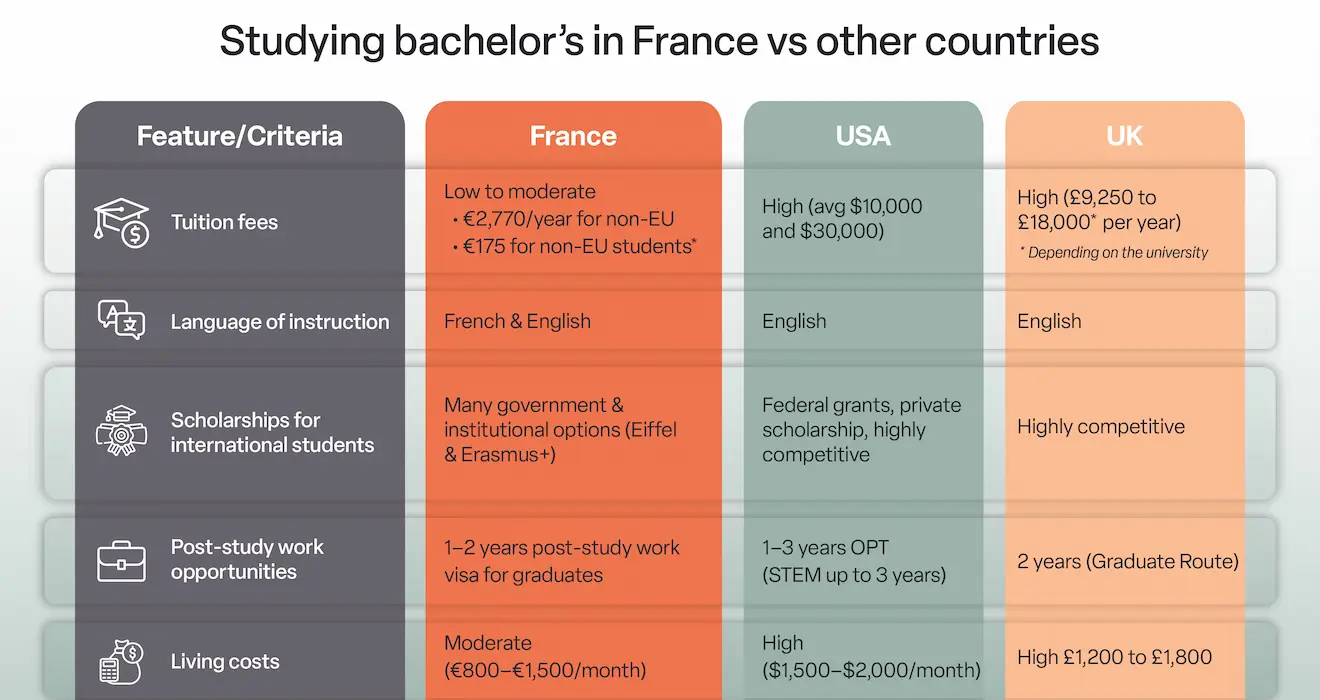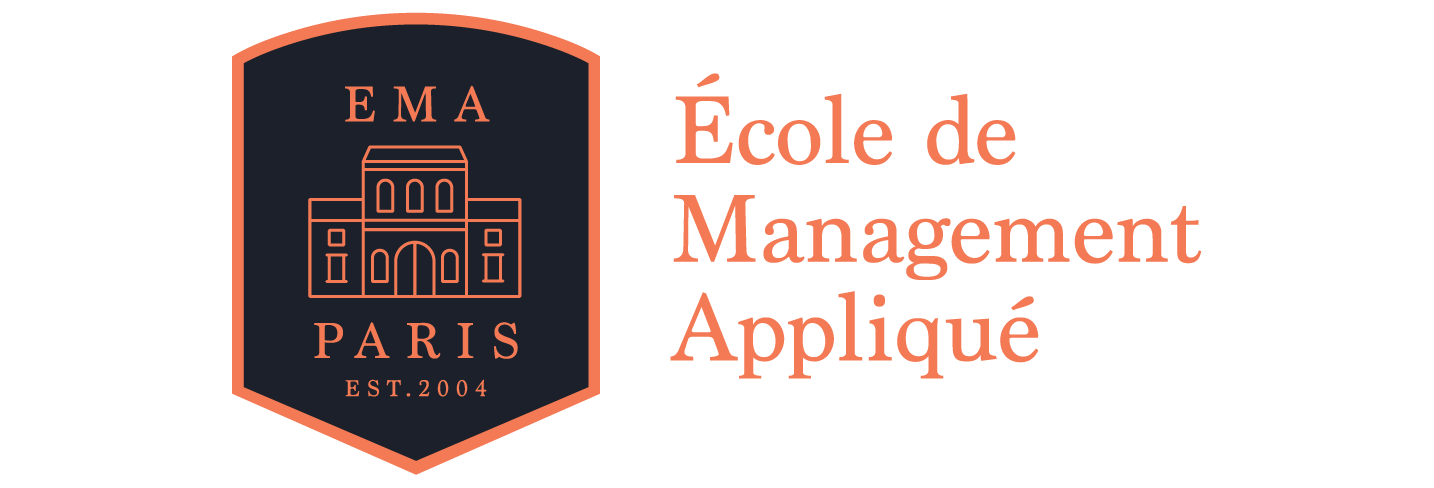International exposure is one of the great advantages of studying in France, as it places students in a multicultural environment where they interact with peers from around the world. This experience sharpens communication, adaptability and problem-solving skills. Engaging with diverse perspectives and navigating new cultural contexts broadens your worldview and strengthens your ability to work in international teams.
Choosing where to pursue your undergraduate studies is an important decision that shapes your personal and professional future. These are the crucial years of life that help you bond with yourself, make friends and sculpt your future. Among the many options available, the advantages of studying in France are endless, such as its rich heritage of academic excellence and culture. These factors make it a top destination for international students worldwide.
With over 430,000 international students in the 2023–2024 academic year, France is steadily progressing towards its goal of welcoming 500,000 students by 2027. This means any international students planning to pursue their bachelor’s in France is likely to engage with the cultures of these countries, let alone France.
Curious about the advantages of studying in France for your bachelor’s degree? In this blog, we will walk you through five key benefits that make France a top choice for international students.
1. Accredited and certified by the French Government
One of the biggest advantages of studying in France is the high level of recognition, the French bachelor’s degrees hold. All universities and grande écoles follow strict rules set by the Ministry of Higher Education, meaning their courses meet high academic standards. As a result, a degree from France is valued not just in Europe but around the world; whether you pursue further studies or enter the workforce.
- Quality assurance: French higher education institutions are subject to regular evaluations. This ensures that curriculum, faculty and facilities meet the highest standards.
- Global recognition: Graduates from French institutions are highly sought after by employers worldwide, thanks to the country’s reputation for academic excellence.
- Pathways to further study: The alignment with the European Higher Education Area (EHEA) ensures smooth transitions to master’s programmes in France and across Europe.
Furthermore, the French government and a number of higher education institutions offer various scholarships for studying in France. Government covers a significant portion of higher education costs, around €14,000 per student each year. There is no difference between international and French students when it comes to admission requirements or degrees awarded. This makes quality education more accessible for international students.
2. Cultural exposure
Studying for a bachelor’s in France offers a unique opportunity to immerse yourself in one of the world’s most celebrated cultures. France is renowned for its art, history and lifestyle and as an international student, you will be at the heart of it all, such as:
- Rich heritage: From the Louvre Museum in Paris to the lively festivals in Lyon and the historic streets of Bordeaux. Your student life will be enriched by countless cultural experiences.
- Diverse student cities: French cities are known for their dynamic student communities, each offering a distinct blend of tradition and modernity. Paris is among one such cities that celebrate cultural diversity and offer students a lot to learn.
- Personal growth: Living and studying in a foreign country fosters independence, adaptability and intercultural communication skills. These qualities are highly valued in today’s global job market.
This cultural exposure is a key advantage of studying in France, providing lifelong memories and a broader worldview. You get the opportunity to sit and study with friends from around the world and learn about their culture.
3. Employment after bachelor’s in France
According to the International Monetary Fund (IMF), France ranked 23rd in the world in 2023 for GDP per capita, with an average of $44,408 per person. The country boasts a strong economy, making it an attractive destination for international students. The French government actively encourages international talent, offering work permits that allow graduates to stay and gain professional experience.
- Vibrant economy: France is home to multinational corporations, innovative startups and a thriving SME sector, particularly in industries such as luxury goods, technology, finance and engineering.
- Post-study work opportunities: After completing bachelor’s degree in France, international graduates can apply for work permits. This makes it easier to transition from student life to professional employment in France.
- Global connections: Studying in France provides access to a vast network of alumni and industry contacts, facilitating internships and job placements both locally and internationally.
France’s job market is a significant draw for ambitious students, offering a springboard for launching successful international careers.
4. English-taught programmes for global accessibility
While French is the official language, there is a growing number of bachelor’s degrees in France that are taught entirely in English, especially in fields such as business and management. This makes France an accessible option even for those who do not speak French fluently.
- Wide range of English-taught programmes: Many top universities and business schools offer bachelor’s courses in English, ensuring language is not a barrier to high-quality education.
- Support for language learning: Many higher education institutions in France, provide French language classes, allowing students to gradually acquire proficiency and integrate more fully into French society.
- International community: The presence of a large international student population means you will be part of a diverse, multilingual environment.
The availability of English as a programme language is a major advantage, enabling students from around the world to benefit from a French education.
5. Supportive ecosystem for young innovators and entrepreneurs
France is at the forefront of fostering innovation and supporting young entrepreneurs, making it an ideal destination for students with an entrepreneurial spirit.
- Investment in research and development: The French government and private sector invest heavily in research and development, providing students with access to cutting-edge facilities and resources.
- Startup ecosystem: Cities like Paris and Lyon are renowned for their vibrant startup scenes, with numerous incubators, accelerators and networking events tailored to young innovators.
- Supportive policies: International students and graduates benefit from policies that encourage entrepreneurship, including visa schemes for startup founders and access to funding opportunities.
- Collaborative learning: French business schools including École de Management Appliqué (EMA) emphasise project-based learning and collaboration, equipping students with practical skills to launch their own ventures.
This environment, favourable to innovation, is a standout feature of the French education system, empowering students to turn their ideas into reality.
Additional benefits: scholarships and affordability
Another great benefit of studying in France is the availability of scholarships. Both the French government and private business schools offer many options to help international students. These scholarships can lower your tuition and living costs, making it easier to afford a bachelor’s degree in France. Take a look at the table below to see a simple comparison.

Some of the key advantages of studying in France includes:
Institutional and Erasmus+ scholarships: Many universities offer their own scholarships and EU-funded programmes like Erasmus+ provide additional financial support. For example, EMA in Paris frequently offers generous scholarships, including up to 50% off first-year tuition fees for select intakes, awarded based on academic excellence or notable achievements in extracurricular activities. This makes a bachelor’s degree in France even more accessible for talented students seeking a high-quality education.
French government scholarships: Prestigious awards such as the Eiffel Excellence Scholarship and Charpak Scholarships support talented international students.
ECTS Credits: A significant benefit of pursuing a bachelor’s degree in France is the use of the European Credit Transfer and Accumulation System (ECTS). This system standardises academic credits across Europe, making it easier for students to transfer credits between universities within France and across other European countries.
This flexibility is an important benefit for students who may wish to continue their studies or pursue career opportunities elsewhere in Europe following their graduation. The advantages of studying in France for higher education are manifold.
Apply for a bachelor’s in France at EMA, Paris
Pursuing a bachelor’s degree in France is enriching and EMA in Paris takes these benefits to the next level. EMA provides internationally recognised qualifications backed by rigorous academic standards and a multicultural environment. The business school’s location is in the heart of Paris and it offers English-taught programmes. This ensures students will enjoy both cultural immersion and academic flexibility.
With strong industry connections and a global alumni network, students at École de Management Appliqué are well-prepared to start successful global careers. You will get a high-quality education, experience French culture and gain real-world skills that open doors to global opportunities after graduation.
FAQs about bachelor's degree in France
1. In what ways can international exposure enhance the essential skills gained during studies?
2. What are the key elements that make a university experience truly life-changing?
A truly life-changing university experience is shaped by a combination of academic excellence, vibrant student life and opportunities for personal growth. In France, business schools focus on creating an environment that fosters both intellectual development and well-being, offering excellent courses, supportive resources and a diverse campus culture. The bachelor’s experience in France is further enriched by access to world-class research, strong industry connections and a culture of innovation, all of which prepare students for future success.
3. Is it possible to study in France without knowing the French language?
Yes, it is entirely possible to pursue a bachelor’s degree in France without prior knowledge of French. Many French universities and business schools now offer a wide range of English-taught programmes, especially at the undergraduate level.
4. How can I apply for a bachelor’s degree in France?
To apply for a bachelor’s in France, international students should first research suitable universities and programmes, ensuring they meet academic and language requirements. The application process involves submitting an online application form, academic transcripts, a statement of purpose and sometimes language proficiency test scores. Additionally, applicants should explore available scholarships for studying in France to support their academic journey.
5. Is France good for bachelor's degree?
Absolutely. France is one of the top destinations for international students, with over 240,000 choosing to pursue their bachelor’s degrees across a wide range of subjects, thanks to its high-quality education system and global reputation.

 Brochure
Brochure
 Apply Now
Apply Now